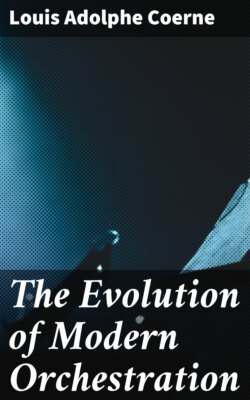Читать книгу The Evolution of Modern Orchestration - Louis Adolphe Coerne - Страница 7
На сайте Литреса книга снята с продажи.
I.
ОглавлениеTable of Contents
Primitive men were no doubt impelled to give utterance to their feelings by a desire for awakening sympathetic response in their fellow beings. Vocal manifestation of feeling developed into incipient melody, hence rudimentary scales. Gestures of dancing suggested rhythm. A fusion of both melody and rhythm led to contrast, and contrast implies symmetry of design. To emphasize rhythm combined with euphony, musical instruments were needed. Relics of certain species of these instruments are analogous to subsequent species of civilized nations.
Another source whence music can be traced is in the religious rites of the pagans.
Ancient history reveals diversified and wide-spread musical activity. The oldest representations of musicians are to be found on Egyptian monuments. Through contact with Oriental nations, Egypt possibly founded her system of intellectual music on extraneous principles. On the other hand, she probably influenced the music of the Hebrews, certainly that of the Greeks. Exemplification of Oriental instrumentalists is seen on Assyrian bas reliefs. One of these, in the possession of the British Museum, represents performers on a drum, a double-pipe, a primitive species of the dulcimer, and seven harps. The preponderance of stringed instruments suggests sensitive appreciation for modulated quality of tone. Constant reference to Hebrew music is, of course, to be found in the Scriptures. The classification of singers for temple worship during the reign of Solomon and of David, and the especial importance attached to song with instrumental accompaniment will at once recur to the mind.
Greece during her ascendency elevated music to a plane of importance only secondary to that of her sister art, poetry, whose handmaiden she became. Indeed, though both vocal and purely instrumental music were practised independently, prominence was bestowed upon the welding together of poetry and music as embodied in the Athenian tragedies. The Greeks possessed but a theoretical knowledge of harmony. Instrumental accompaniment probably duplicated the vocal melody in unison or octave, and may have added some simple harmonic intervals such as the fourth or fifth.
With the disorganization of Greece, music was transplanted to Rome, and, being no longer looked upon as an art, sank into degeneracy. Nevertheless, the fundamental principles governing the science of music as promulgated by the Greek theoreticians were rescued from oblivion by early Roman writers. And these principles, leavened by fragments of melancholy and contemplative strains of Hebraic melody, devolved from the early Christian neophytes, were destined to constitute the rock upon which all subsequent Western ecclesiastical music, even to the present day, has been built.
Review thus far tends to show that the objective of prehistoric and ante-Christian musical thought was primarily the emotional expression of human feeling. The growth of musical art was, moreover, amazingly dilatory as compared with that of the other fine arts.
